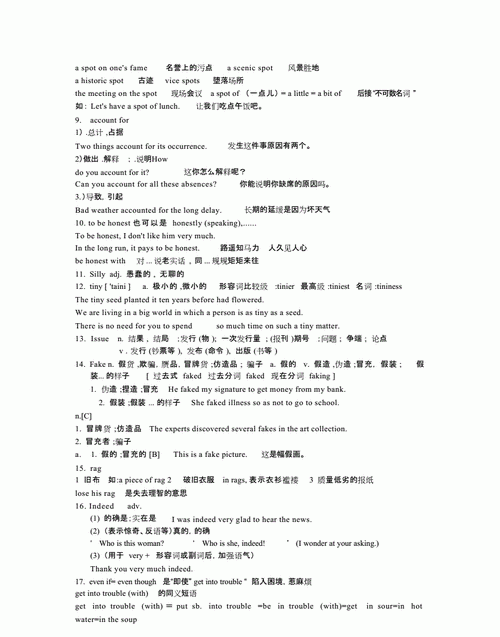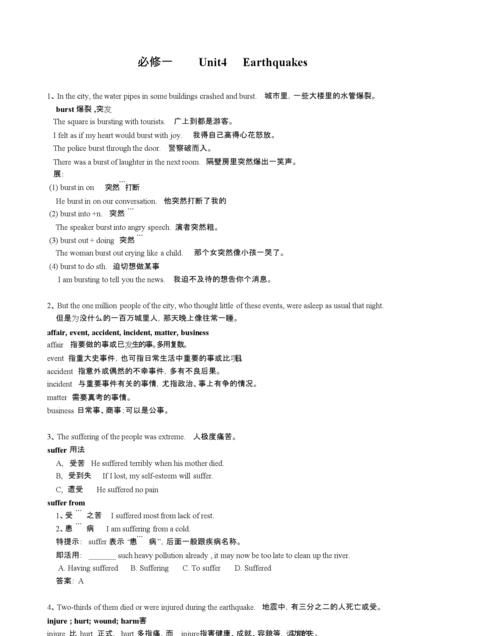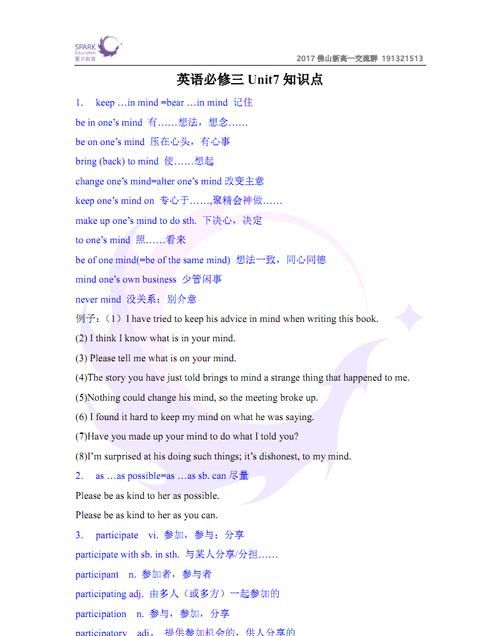本文目录
高中英语所有知识点总结
Unit 1
1.mean doing sth. 意味着; mean to do sth. 打算或企图做某事;
mean sb. to do sth. 打算让某人做某事 be meant for 打算作……用;
2.take place 发生;举行
3.of all kinds 各种各样的
4.starve to death饿死 be starved of 缺乏, starve for sth, starve to do,渴望
5.plenty of 大量; 充足
6.be satisfied with感到满意 to one’s satisfaction感到满意是
7.do harm to sb.=do sb. harm 伤害某人
8.in the shape of呈…的形状,以…的形式
9.in memory of/ to the memory of sb.纪念某人
10.dress up 穿上最好的衣服;打扮,化装
11.award sth.(to sb.)和award sb.sth.(for sth.) 给予、颁奖 reward sb. for sth. 因 …奖赏某人; reward sb. with sth. 用某物酬劳某人
12. admire sb. for sth在某方面钦佩某人
13.look forward to期望,期待,盼望
14,have fun with(与某人)玩得开心;过得快乐 ( have a good time, enjoy oneself.)
15. turn up.来;出现;把(收音机等)音量开大些 turn down 拒绝; turn off 关掉; turn on 打开; turn out 结果是...... turn to sb. for help 向某人求助
16.keep one’s word 守信用; break one’s word, 失信
17.It be obvious that-clause 显而易见;一目了然 18.set off 动身, 出发; 使(地雷、炸弹)爆炸; set in开始; set up建立,创立 ; set out to do = set about doing sth.着手做 set down 写下,记下 19.remind sb. of sth. 提醒,使想起
Unit 2
1.a healthy diet健康饮食;
a balanced diet平衡的饮食
2.in different way用另外方式
3.most often最经常
4.feel frustrated感到沮丧
5.by lunchtime到午餐时间
6.must have happened一定发生过
7.at the end of the street在街道的尽头
8.be tired of 厌倦
9.be amazed at sth. 对...感到惊奇
10.throw away扔掉
11.get away with 逃脱
12.tell lies说谎
13.energy-giving food提供热量的食物
body-building foods提供营养的食物
14feel fit保持精力旺盛
15.the weakness of the diet饮食的弱点
the strength of the diet饮食的优点
16.do some research into做一些...方面的研究
17.earn one’s living谋生
18.be in debt负债
19.glare at怒视
20.move round绕过
21.spy on在暗中侦察;打探
22.upset sb.使......不安
23.look ill 感到不舒服feel sick感到恶心
24.heavy food不易消化的食物
25.chat(ting) about聊起关于......
26.serve with用......配
27.rather than而不是
28.cut down减少
29.before long不久
Unit 3
1. know about 了解关于…事
2. make a bet 打赌
3. win or lose the bet 在打赌中赢或输
4. have bad luck 运气不好
5. step inside 走进里面
6. lead the way 带路
7. I wonder if 我想知道是否…
8. go right ahead 说下去
9. as a matter of fact 事实上
10. by accident 偶然
11. sail out of the bay 驶出海湾
12. stare at 盯着
13. towards nightfall 到夜幕降临时
14. carry … out to sea 把…带到了大海
15. give oneself up for lost 因为迷路而绝望
16. work as an unpaid hand 免费劳动
17. account for 导致
18. to be honest 坦白地说
19. your idea of some kind of joke 你认为的一种笑话
20. be on my way 上路
21. show sb. out 把某人带出去
22. be confident about 对… 自信
23. the cost of a journey 旅行费用
24. give sb. a ride 让某人搭车
25. lose one’s patience 失去耐心
26. do fifty jumps without stopping 不间断地连续跳五十下
27. fall over 跌到
28. account for your behaviour 对你的行为做出解释
29. be jealous of the others’ success 嫉妒别人的成功
30. show a willingness to do sth. 表示乐意做谋事
31. stay out of jail 免坐牢
32. be reserved 被预定了
33. take the gentleman’s order 让那位绅士点菜
34. the look on the waiter’s face 服务员脸上的表情
35. take a chance 碰碰运气
36. read the bill 看帐单
37. in a rude manner 用粗鲁的方式
Unit 4
1. think of…as 把……看作是
2.a cloud of energetic dust具有能量的尘埃
3. combine into…合成……
4. move around the sun环绕太阳运转
5. become violent变得激烈
6. the solid surface固体表面
7. explode loudly猛烈爆炸
8. in time及时,最终
9. produce the water vapor产生水蒸汽
10. make the earth’s atmosphere构成了地球的大气层
11.cool down冷却
12. on the surface在表面
13. be different from…与……不同
14.go round the sun环绕太阳运转
15. disappear from…从……消失
16. stay on…存留在……
17. show one’s quality显现某人的特性,
18.dissolve harmful gases分解,溶解有害气体,
19. become part of…变成……的一部分,
20. develop life发展生命,
21.grow in the water在水里生长,
22. encourage the development of…鼓励……的发展,
23 millions of years later几万年以后,
24.live on land在陆地上生活,
25. live in the sea在海里生存,
26. grow into forests长成森林,
27. produce young生出幼仔,
28. lay eggs下蛋,
29.animals with hands and feet长着手脚的动物,
30.spread all over the earth遍布全世界,
31.develop new methods发展了新的方法,
32.. move around迁徙,
33. go by过去,推移,
34.prevent…from…防止……做……,
35.escape from… into…从……逃离到……,
36.depend on….依靠,依赖,取决与……,
37. solve a problem解决
38 be lucky enough足够幸运,
39 make a trip 去旅行
40. visit the moon参观月球,
41. in the spaceship在太空飞船中,
42. explain to… that…向……解释……,
43. on the journey在旅程中,
44 be off启程,
45 rise into the air升人太空,
46. feel the pull of the earth感觉到地球的拉力,
47call…gravity称……为地球引力,
48. push…into the seat把……推向座位,
49. say…to each other向彼此说……,
50.fall back to…朝……落下去,
51.fall from a tree从树上掉下来,
52. fall to the ground朝地上落下去,
53. get close to…接近……,
54 cheer up高兴起来,
55 float weightlessly around失重飘来飘去,
56 in the spaceship cabin太空船舱,
57. watch…do看着……做,
58. move freely自由的活动,
59. climb down the steps从梯级上爬下来,
60. step forward向前迈步,
61.fall over摔倒,
62. need practice需要练习
63..get the hang of…掌握了……的诀窍,
64. enjoy oneself感到自如,
65. leave the moon’ s gravity摆脱月球引力
66. come back to…回到……
Unit 5
1. frost on the ground地上覆盖了一层薄霜
2. around noon中午时分,
3. the most wealthy and biggest city in Canada加拿大最大最富有的城市
4. leave for…离开去……
5. go on a tour of the city继续在市内游览一番
6. go up the tower登上塔顶
7. look across the lake俯瞰湖面
8. flow into…流人……
9. flow over…流经……
10. on one’s way to…在去……的路上
11. a covered stadium加顶的运动场
12. walk north向北走
13. phone… from a telephone booth到电话亭给……打电话
14. have dinner in downtown Chinatown在市内的中国城吃晚饭
15. move to…移居到……
16. meet… at…在……迎接……
17. get good Cantonese food吃到好吃的广东菜
18. come from South China来自中国南方
19. go as far as Ottawa去到远至渥太华
20. about four hundred kilometers northeast of Toronto距多伦多东北大约有400公里
21. take too long花费的时间长
22. at dawn黎明
23. at the train station在火车站
24. have English words in small letters有小字体的英文标注
25. go downtown到市区去
26. be close to…,接近……
27. spend the afternoon in the lovely shops整个下午在可爱的商店
28. visit… in…在……拜访……
29. sit in a café坐在咖啡馆
30. look over…眺望……
31. sit down with…和……坐在一起
32. on a train trip across…坐着火车上横穿……
33. have a French culture具有法国文化
34. speed along the river toward…沿着河流驶向……
35. dream of…梦想……
36. on a trip在旅途中)
37. on the Atlantic coast在大西洋海岸
38. take the aeroplane乘飞机
39. fly from… to…从……飞行到……
40. take the train from… to…乘火车从……到……
41. from west to east从西到东
42. across Canada横穿加拿大
43. cross the whole country横贯整个国家
44. at the airport在机场
45. take…to…把……带到……
46. catch the train乘坐火车
47. on the way to…在去……的路上
48. see great scenery看美丽壮观的风景
49. on the trip在旅途中
50. go eastward向东行驶
51. pass cities经过城市
52. in less than five days在不五天的时间里
53. from coast to coast从一个海岸到另一个海岸
54. in the warmest part of…在最热的地方
55. be surrounded by…被……所包围
56. on the north在北边
57. ski in the mountains在山上滑雪
58. sail in the harbour在港湾了扬帆行船
59. north of………的北边
60. settle down in the seat落座,
61. look out of the window at the wild scenery从窗口看到了自然风光
62. a mountain goat野山羊
63. a grizzly bear大灰熊
64. a famous Western festival有名的西方节日
65. come from all over…全来自……
66. compete in ~ing比赛做……
67. ride wild horses驾驭野马
68. have a gift for ~ing有天资/天分做……
69. work with…与……共处, win…prizes赢得……奖金,
70. live within 320 kilometres of the USA border居住在靠近美国320公里以内的边境地带
71. go through…穿过……
72. a wheat-growing province种植小麦的省份
73. thousands of square kilometers in size面积有数千平方米
74. at the top end of…在……的最上首
75. a busy port繁忙的港口
76. rush through…穿行过

高中英语所有知识点总结
高中英语知识点总结一、语言知识(名词、冠词、数词、代词、动词、形容词、副词)1、名词.概念 名词是表示人,事物,地点或抽象概念的名称的词,有专有名词和普通名词之分,还有可数名词与不可数名词之分..相关知识点精讲.名词复数的规则变化 情况 构成方法 读音 例词 一般情况 加 -s 清辅音后读/s/ map-maps 浊辅音和元音后读 /z/ bag-bags /car-cars 以s, sh, ch, x等结尾 加 -es 读 /iz/ bus-buses/ watch-watches 以ce, se, ze,等结尾 加 -s 读 /iz/ license-licenses 以辅音字母+y结尾 变y 为i再加es 读 /z/ baby---babies 2、冠词 冠词是一个虚词,它置于名词之前,限定名词的意义.冠词可分为定冠词,不定冠词和零冠词三类..相关知识点精讲.a用于辅音发音开头的词前, 如:a book; an用于元音发音开头的词前,如:an apple, an hour. 请区别:a usefulmachine, an umbrella, a “u”, an “h”。.指上文提到过的人或物,用定冠词the。 .在世界上独一无二的事物前用定冠词the. 如:the sun,the moon, the earth。 .the用于序数词,表方位的名词和形容词最高级前。the first, the best , in the south。 .在复数姓氏前加the,表示××一家人,常看成复数。如:the Browns。.在介词短语中常用定冠词the,如:in the box,behind the chair。.不能用定冠词the的几个方面: (1)在节日、星期、月份、季节、年等词前不用冠词。如:in summer, inAugust 请区别:in the spring of 1945. (这里表示特指,故加the)(2)一日三餐和球类运动名不用冠词。如:have breakfast ,playfootball 一些固定词组中,如:goto bed ,go to school, by bus ,at night..在有些词组中,有冠词和无冠词意思不同,请注意区别: in front of 在…前面, in the front of 在…范围内的前部 in hospital (生病)住院, in the hospital 在医院里。3、数词4、代词(人称代词、物主代词、指示代词、反身代词、不定代词、相互代词、疑问代词、关系代词) 代词是代替名词的词, 按其意义、特征及其在句中的作用分为:人称代词、物主代词、指示代词、反身代词、相互代词、疑问代词、不定代词和关系代词等。人称代词
2)人称代词有主格和宾格之分。通常主格作主语,宾格作宾语。如:
I liketable tennis. (作主语) Do you know him?(作宾语)3)人称代词还可作表语。作表语时用宾格。如:---Whos is knockingat the door?---It’s me. 物主代词
1)表示所有关系的代词叫物主代词。物主代词分形容词性物主代词和名词性物主代词,如下表所示。 2)形容词性物主代词的作用相当于形容词,可在句中作定语。例如:
Ourteacher is coming to see us. Thisis her pencil-box.
3)名词性物主代词的作用相当于名词,在句中可用作主语、宾语和表语。
Our school is here, and theirs is there.(作主语)
I've already finished my homework. Have you finishedyours? (作宾语)
指示代词
指示代词包括:this,that,these,those。 1) this和these一般用来指在时间或空间上较近的事物或人,that和those则指时间和空间上较远的事物或人,例如:This is a pen and that is apencil.
反身代词
英语中用来表示"我自己","你自己","他自己","我们自己","你们自己"等意义的代词称为反身代词,也有人称之为自身代名词,其形式如表所示。
反身代词可以在句中作宾语,表语,同位语。 1)作宾语,表示动作的承受者就是动作的发出者,主语和宾语指同一个人或一些人。 He called himself a writer.
2)作表语。 The girl in the news is myself.
3)作主语或宾语的同位语,表示亲自或本人。
I myselfwashed the clothes.(=I washed the clothes myself.)(作主语同位语)
You should ask the teacher himself.(作宾语同位语)
不定代词
不是指明代替任何特定名词的代词叫做不定代词,在句中可作主语、表、宾语和定语。1)some与any的区别①some多用于肯定句,表示“一些,几个”作形容词时,后面可以接①不可数名词+单数动词;②可数名词+复数动词。 Look! Some of the students are cleaning the library. . Some rice in thebag has been sold out. ②any多用于疑问句、条件句和否定句中,表示“一些,任何”用作形容词时,后面可以接①不可数名词+单数动词;②可数名词+复数动词。 If you have any questions, please ask me. Thereisn't any orange in the bottle. 2) few, a few, little, alittle在用法上的区别①用作形容词: 含义 用法 表示肯定 表示否定 用于可数名词 a few虽少,但有几个 few不多,几乎没有 用于不可数名词 a little,虽少,但有一点 little不多,没有什么 I'm going to buy a fewapples. He can speak only alittle Chinese. He has few friends.3)other, the other, another, others, the others的区别。 用 法 代名词 形容词 单数 复数 单数 复数 不定 another 另一个 others 别人,其他人 another (boy) 另一个(男孩) other (boys) 其他男孩 特定 the other 另一个 the others 其余那些人、物 the other (boy) 另一个男孩 the other (boys) 其余那些男孩 4)every与each的区别。 each every 1)可单独使用 1)不可单独使用 2)可做代名词、形容词 2)仅作形容词 3)着重“个别” 3)着重“全体”,毫无例外 4)用于两者或两者以上中的每一个人或物 4)用于三者或三者以上每一个人或物 The teacher gave a toyto each child. Each ball has a different colour. Every student loves theEnglish teacher. = All students love the English teacher.5)all和both的用法。①all指三者以上,或不可数的东西。谓语动词既可以用单数,也可以用作复数。在句中作主语、表语、宾语、同位语和定语。 All of us like Mr Pope.我们都喜欢Pope先生。(作主语) = We all like Mr Pope.(作同位语) All the water has beenused up. (作主语) That's all for today. (作表语) Why not eat all (of) the fish? (作宾语)Lucy andLily both agree with us. Both of the books arevery interesting.相互代词 表示相互关系的代词叫做相互代词。相互代词有each other 和one another两种形 式。在当代英语中,each other和one another没有什么区别。相互代词可在句中作宾语,定语。作定语用时,相互代词用所有格形式。 Weshould learn from each other / one another. (作宾语) 疑问代词
疑问代词有who,whom,whose,what和which等。疑问代词用于特殊疑问句中,一般都放在句首,并在句子中作为某一句子成分。例如:Who is going to come here tomorrow? (作主语) What is that? (作表语)Whose umbrella is this? (作定语) Whom are you waiting for? (作宾语)关系代词关系代词是一种引导从句并起连接主句和从句作用的代词。关系代词有 who, whose, whom, that, which. 它们在句中可用作主语,表语,宾语,定语. 在主句中,它们还代表着从句所修饰的那个名词或代词。例如:I hate people who talk much but do little.I’m looking at the photograph which you sent me with yourletter.5、动词 (动词的时态与语态、情态动词、非谓语动词【分词{现在、过去}、动名词】)系动词、助动词、动词辨析) 分词 分词分为现在分词和过去分词两种,是一种非谓语动词形式.相关知识点精讲:1.现在分词的用法: 1) 做表语: Thatbook was rather boring. 很多动词的现在分词都可以作表语: exciting,interesting, encouraging, disappointing, confusing, touching, puzzling. 2) 作定语:That musthave been a terrifying experience. I found him a charming person. 现在分词短语还可以放在名词的后面修饰名词, 相当于一个定语从句: There are a few boysswimming in the river.There is a car waiting outside. 3) 作状语:现在分词短语可以表示一个同时发生的次要的或伴随的动作: Following Tom, westarted to climb the mountain Opening the drawer, he took out a box. 现在分词短语还可以表示原因,相当于一个原因状语从句: Not knowing heraddress, we couldn’t get in touch with her. 现在分词短语还可以表示时间,相当于一个时间状语从句: Hearing the news,they all jumped with joy. Jim hurt hisarm while playing tennis. Be careful whencrossing the road. 4)作宾补: 现在分词在一些动词之后可以做宾语的补语: 例如, see,hear, catch, find, keep , have 等. I see himpassing my house every day. Ismelt something burning. She kept himworking all day.2.过去分词的用法: 1) 作表语: She felt confused, andeven frightened. I’m satisfied with your answer. He is not interested inresearch. 2) 作定语:Theteacher gave us a satisfied smile. cooked food a written report fried eggs boiled water fallen leaves What’s the language spoken in thatcountry? 3)作状语:Seen fromthe hill, the city looks magnificent. They came in, followed by some children. 4)作宾补: 过去分词也同样可以作宾语的补语, 接在某些动词后面 I will have theclothes washed tomorrow. When they get back home, they found the room robbed. 动名词动名词由动词原形+ING构成,是一种非谓语动词形式 相关知识点精讲:1.作主语。例如:Fightingbroke out between the South and the North. 南方与北方开战了。 2.作宾语 有些动词可以用动名词作宾语。例如: admit 承认 appreciate 感激 avoid 避免 complete完成 consider认为 delay 耽误 finish 完成 imagine 想象 mind 介意 miss 想念 postpone推迟 例如:Would youmind turning down your radio a little, please? 你把收音机音量调小一点,好吗 b. 有些结构后面可以用动名词作宾语或其他成分。例如: burst out keep on insist on count on set about put off be good at take up give up be successful 3.作表语,对主语说明、解释。例如:Her job is washing,cleaning and taking care of the children. 她的工作是洗刷、清扫和照顾孩子。比较:She iswashing, cleaning and taking care of the children.4.作定语,一般表示所修饰名词事物的用途。例如:a writing desk 写字台 a swimming pool游泳池

高中英语知识点总结大全
知识是人们前进的最大动力,因为有知识,我们知道我们从哪里来,也知道我们将要到哪里去。下面是由我为大家整理的高中英语知识 总结 ,仅供参考,欢迎大家阅读。
高中英语知识总结1
一般现在时 (do/does; is/am/are)
① 表示现在的情况、状态或特征。
例:He is a student.
他是一个学生。
② 表示经常性、习惯性动作。
例:He always helps others.
他总是帮助别人。
③ 客观事实和普遍真理。
例:The earth moves the sun.
地球绕着太阳转。
④ 表示一个按规定、计划或安排要发生的动作。
仅限于某些表示“来、去、动 、停、开始、结束、继续”等的动词,可以与表示未来时间的状语搭配使用 。
常见的用法是:飞机、火车、轮船、汽车等定期定点运行的交通方式。
例:The next train leaves at 3 o clock this afternoon.
下一趟火车今天下午3点开车。
⑤ 在时间、条件和让步状语从句中经常用一般现在(有时也用现在完成时)表示将的来事情。(即:主将从现原则)
例:I will call you as soon as I arrive at the airport.
我一到机场就会给你打电话。
When you have finished the report, I will have waited for about 3 hours.
等你完成这份 报告 的时候,我就已经等了将近3个小时了。
高中英语知识总结2
现在完成时(have/has done)
① 表示动作到现在为止已经完成或刚刚完成,强调对现在产生的影响。
例:I bought a new house, but I haven t sold my old one yet, so at the moment I have two houses.
我买了一所新房子,但是还没有卖掉旧的,所以现在我又两所房子。
② 表示从过去某时刻开始,持续到现在的动作或情况,并且有可能会继续延续下去。此时经常用延续性动词。
时间状语常用since加一个过去的时间点,或for加一段时间,或by加一个现在时间。
例:Great as Newton was, many of his ideas have been challenged today and are being modified by the work of scientists of our time.
虽然牛顿是个伟大的人物,但他的许多见解直到今天还在受到挑战,并且被现代科学家的工作所修正
高中英语知识总结3
现在进行时(am/is/are doing)
① 表示此时此刻正在发生的事情。
例:He is listning to the music now.
他现在正在听音乐。
② 表示目前一段时间内一直在做的事情,但不一定此时此刻正在做。
例:I am studying computer this term.
这个学期我一直在学习计算机。
③ 现在进行时可以表示将来的含义。
a. 瞬时动词的进行一定表将来。
例:I am leaving.
我要离开了。
b. 持续动词的进行只有有将来的时间状语或有将来语境中才表将来。
例:I am travelling next month.
下个月我要去旅行。
④ 现在进行时与频度副词连用,表示说话者或褒义或贬义的感情色彩。
例:He is always helping others.
他总是帮助别人。(褒义)
高中英语知识总结4
过去进行时(was/ were doing)
① 表示在过去具体的时间正在发生的动作。
例:Mary was listening to light music 10 minutes ago.
10分钟前,玛丽正在听轻音乐。
② 表示过去某个时间段内一直在发生的事情。
例:I was travelling in London last summer vacation.
去年暑假我在伦敦旅行。
③ 过去进行时可以表示过去将来的含义。
a. 瞬时动词的过去进行时一定表示过去将来的含义。
例:Then she said she was leaving.
然后她说她要离开了。
b. 持续动词的过去进行时只有在有过去将来的时间状语或过去将来的语境下才能表示过去将来。
例:She said that she was travelling the next day.
她说她第二天要去旅行。
④ 过去进行时和频度副词连用可以表示说话者或褒义或贬义的感情色彩。
高中英语知识总结5
一般将来时
(1)will do
① 表示主语主观意愿的将来。
例:I will send her a glass hand-made craft as her birthday gift.
我将送给她一个玻璃的手工制品,作为给她的生日礼物。
② 表示客观将来。
例:Fish will die without water.
离开水,鱼会死。
③ 表示临时决定。
例:——Mary has been ill for a week.
——Oh,I didn t know. I will go and see her.
(2)am/is/are going to do
① 表示计划、打算做某事。
例:This is just what I am going to say.
这正是我想说的。
② 表示根据某种迹象看,很可能或即将发生的事情,表推测。
例:Look at the dark clouds in the sky. It s going to rain.
看天上的乌云,要下雨了。
(3)am/is/are about to do
表示“即将、正要”时,可用。强调近期内或马上要做的事。
例:Don t worry, I am about to make a close examination on you.
别担心,我马上就给你做一次仔细的检查。
(4)be to do
① 表示“按计划、安排即将发生某事或打算做某事”。
例:She is to be seen in the lab on Monday.
星期一你准会在实验室见到她。
② 该做或不该做的事情(语气上接近于should, must, ought to, have to),表示一种命令、规劝性语气。
例:You are to go to bed and keep quiet, kids. Our guests are arriving in less than 5 minutes.
孩子们,你们必须 上床睡觉,不准吵闹。我们的客人5分钟之内就要到了。
高中英语知识点总结相关 文章 :
★ 高中英语语法知识点整理总结
★ 高中英语知识点总结大全
★ 高中英语知识归纳笔记
★ 高中英语基础知识点总结
★ 高一英语必修知识点总结
★ 高中英语选修7知识点总结
★ 人教版高一英语知识点总结
★ 高中英语的知识点整理
★ 高中必备英语知识点归纳
★ 高一英语必修一知识点归纳总结

高中英语知识点归纳总结
高中英语知识
代词
一.概念: 代词是代替名词的词, 按其意义、特征及其在句中的作用分为:人称代词、物主代词、指示代词、反身代词、相互代词、疑问代词、不定代词和关系代词等。
二.相关知识点精讲
1.人称代词1)人称代词的人称、数和格,如下表所示。 2)人称代词有主格和宾格之分。通常主格作主语,宾格作宾语。如:
I like table tennis. (作主语)Do you know him?(作宾语)
3)人称代词还可作表语。作表语时用宾格。如---Whos is knocking at the door?---It’s me.
4)人称代词在than之后与其他人或事物进行比较时,用主格和宾格都可以。如:He is older than me. He is older than I am.
2. 物主代词1)表示所有关系的代词叫物主代词。物主代词分形容词性物主代词和名词性物主代词,如下表所示。
2)形容词性物主代词的作用相当于形容词,可在句中作定语。例如: Our teacher is coming to see us.This is her pencil-box.
3)名词性物主代词的作用相当于名词,在句中可用作主语、宾语和表语。 Our school is here, and theirs is there.(作主语)
--- Is this English-book yours? (作表语) --- No. Mine is in my bag. I've already finished my homework. Have you finished yours? (作宾语)
3. 指示代词 指示代词包括:this,that,these,those。
1) this和these一般用来指在时间或空间上较近的事物或人,that和those
则指时间和空间上较远的事物或人,例如:This is a pen and that is a pencil. We are busy these days.In those days the workers had a hard time.
2)有时that和those指前面讲到过的事物,this 和these则是指下面将要讲到的事物,例如: I had a cold. That's why I didn't come.
What I want to say is this ; pronunciation is very important in learning English.
3)有时为了避免重复提到的名词,常可用that或those代替,例如:Television sets made in Beijing are just as good as those made in Shanghai.
高中英语知识总结
一、一般将来时
1.概念:表示将要发生的动作或存在的状态及打算、计划或准备做某事。
2.时间状语:Tomorrow, next day(week, month, year…),soon, in a few minutes, by…,the day after tomorrow, etc.
3.基本结构:主语+am/is/are +going to + do+其它;主语+will/shall + do+其它
4.否定形式:主语+am/is/are not going to do ;主语+will/shall not do+其它
5.一般疑问句:be放于句首;will/shall提到句首。
6.例句:They are going to have a competition with us in studies.他们将有一场比赛和我们一起研究。
It is going to rain.天要下雨了。
二、 一般过去将来时
1.概念:立足于过去某一时刻,从过去看将来,常用于宾语从句中。
2.时间状语:The next day (morning, year…),the following month(week…),etc.
3.基本结构:主语
+was/were +going to + do+其它;主语+would/should + do+其它
4.否定形式:主语+was/were+not + going to + do; 主语+would/should + not + do.
5.一般疑问句:was或were放于句首;would/should 提到句首。
6.例句:He said he would go to Beijing the next day.他说他第二天要去北京。
I asked who was going there.我问,谁要去那里。
高中英语知识要点
名词复数的不规则变化
1)child---children foot---feet tooth---teeth mouse---mice man---men woman---women 注意:与 man 和 woman构成的合成词,其复数形式也是 -men 和-women。
如: an Englishman,two Englishmen. 但German不是合成词,故复数形式为Germans;Bowman是姓,其复数是the Bowmans。
2) 单复同形 如:
deer,sheep,fish,Chinese,Japanese li,jin,yuan,two li,three mu,four jin
但除人民币元、角、分外,美元、英镑、法郎等都有复数形式。如:
a dollar, two dollars; a meter, two meters
3)集体名词,以单数形式出现,但实为复数。
如: people police cattle 等本身就是复数,不能说 a people,a police,a cattle,但可以说a person,a policeman,a head of cattle,the English,the British,the French,the Chinese,the Japanese,the Swiss 等名词,表示国民总称时,作复数用。 如: The Chinese are industries and brave. 中国人民是勤劳勇敢的。
4)以s结尾,仍为单数的名词,如:
a. maths,politics,physics等学科名词,为不可数名词,是单数。
b. news 是不可数名词。
c. the United States,the United Nations 应视为单数。
The United Nations was organized in 1945. 联合国是1945年组建起来的。
d. 以复数形式出现的书名,剧名,报纸,杂志名,也可视为单数。
"The Arabian Nights" is a very interesting story-book.<<一千零一夜>>是一本非常有趣的故事书。
5) 表示由两部分构成的东西,如:glasses (眼镜) trousers, clothes

以上就是关于英语知识点归纳高中全部,高中英语所有知识点总结的全部内容,以及英语知识点归纳高中全部 的相关内容,希望能够帮到您。

